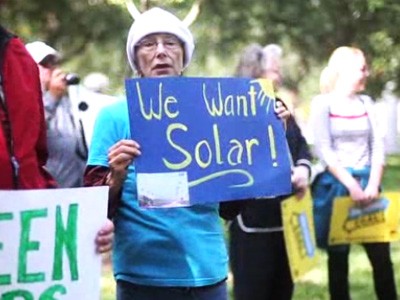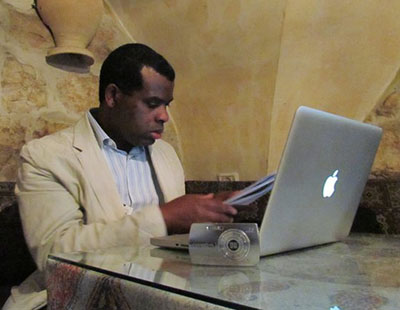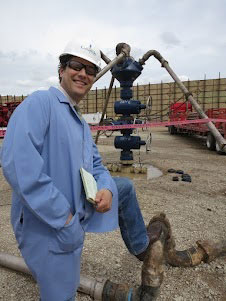Ivan Penn, Tampa Bay Times reporter, started his journalism career as a TV weatherman—in elementary school for an in-house cable program. His father, an avid consumer of the news, inspired him to pursue journalism.
“I was overwhelmed with news, so the Freudian piece of that would probably be that I was trying to get some attention from my father. So you become a journalist, you become what he loves,” Penn joked.
Penn worked on the middle school yearbook team and the high school newspaper. He became editor of The University of Maryland’s daily newspaper, the Diamondback. In the “real world,” Penn reported for the Miami Herald and the Baltimore Sun before joining the Tampa Bay Times business team in 2006. He covers energy, utilities, and consumer issues. You can follow Penn on Twitter: @Consumers_Edge
Penn is also a 2014 Gerald Loeb Finalist in the Beat Reporting Category for his coverage on Duke Energy and Nuclear Power in Florida.
As with any reporting, there is a competition between other news outlets on getting accurate information first. When asked about a time a blogger supposedly beat him on a fact, Penn said competition is a good thing.
“Nobody likes to get beat, but it’s the thing that keeps you on your toes,” Penn said. “It impresses upon us to know our beat and to know what’s going on so the competition doesn’t get ahead of you.”

The best way to stay ahead is to start attending public meetings and knowing the players in your beat, according to Penn. Building sources is an important art to master.
Penn took time to talk with us about his tips for energy beat reporting, data research, and gaining sources’ trust.
1. Your stories about Duke helped readers understand the nuclear energy’s company impact on its customers. What advice would you offer reporters who want to get inside a company the way you appear to have done?
Well most of it always begins with following the money. With business reporting in particular, checking Securities and Exchange Commission filings on businesses and if they’re a public entity like a utility company, attending public meetings, public service commission meetings on the state level—that’s where you see a lot of things happening. A lot of documents are being filed. Those are good places to begin.
2. Compared to the arts or sports, consumers may not choose energy as their first topic to read in papers or online. How do you make the topics like energy and utilities interesting and relevant to your readers?
Well to sound a little redundant, part of it is again to follow the money because the basic thing that matters to all of us are the pocketbook issues, and that’s how you’re going to make it interesting, to let people know how this is affecting their money. Obviously people aren’t going to be all that excited about concrete nuclear reactor containment buildings and power lines and how much the fuel costs to power a natural gas plant, but what they are going to care about is “what is my utility bill going to look like” because of whatever action the utility has taken. So it’s following those pocketbook issues.

5. What is a misconception, if there are any, journalists tend to have toward covering a beat like energy and utilities?
Some people believe you need to be a scientist or engineer. But like with any beat, I’ve covered everything from neighborhood sidewalks to mayors and governors and legislatures and courts and prison to energy, and I’m not an engineer or a politician or a prison warden. So the big thing is, I can’t say it enough, you follow the money whatever the beat is and then you ask a lot of questions. You talk to the engineers, you talk to the scientists, you talk to the accountants to understand. They are very complex issues. Nuclear plants and our various sources of energy, whether cold, nuclear, natural gas, wind, solar, whatever the sources are, there are a lot of complicated issues involving them and what we have to do as journalists is ask good questions.
4. At the Miami Herald, you also worked as a computer assisted researcher in addition to being a reporter. How can reporters research data without having to go to a data journalist?
Nowadays most of us can work an Excel file, and when I was being trained with computer skills, most people in the newsroom didn’t know what a spreadsheet was. Again it’s about following the money; it’s what we do, and there are numbers in most everything that people cover, regardless of what it is. Knowing how to work your way through an Excel file will help you to be able to analyze those numbers, whether it’s how much cost is that going to cost per person in the state or looking at the population or how much will that cost each person on their bill. Some of these are not things you need a mathematician or an economist to do for you. You can if you know how to work your way through an Excel file.
5. You mentioned building relationships is important in beat reporting. Do you have any advice for reporters on how to get people to trust them?
You always have to be honest with your sources, particularly when it comes to confidential sources. If you say you’re going to protect them, then you need to protect them. It depends on the source. When someone says that something is off the record, you have to honor them. Now if a public official says something that may threaten the public safety or something extreme, and they want that to be off the record, you have to evaluate. If you make the promise to them, you need to keep that promise. That’s how you’re going to build trust, but then you also have to evaluate what is it that, what are you committing to is I guess the way I should say it. You have to always evaluate what you commit to, and what you commit to, you need to honor.










